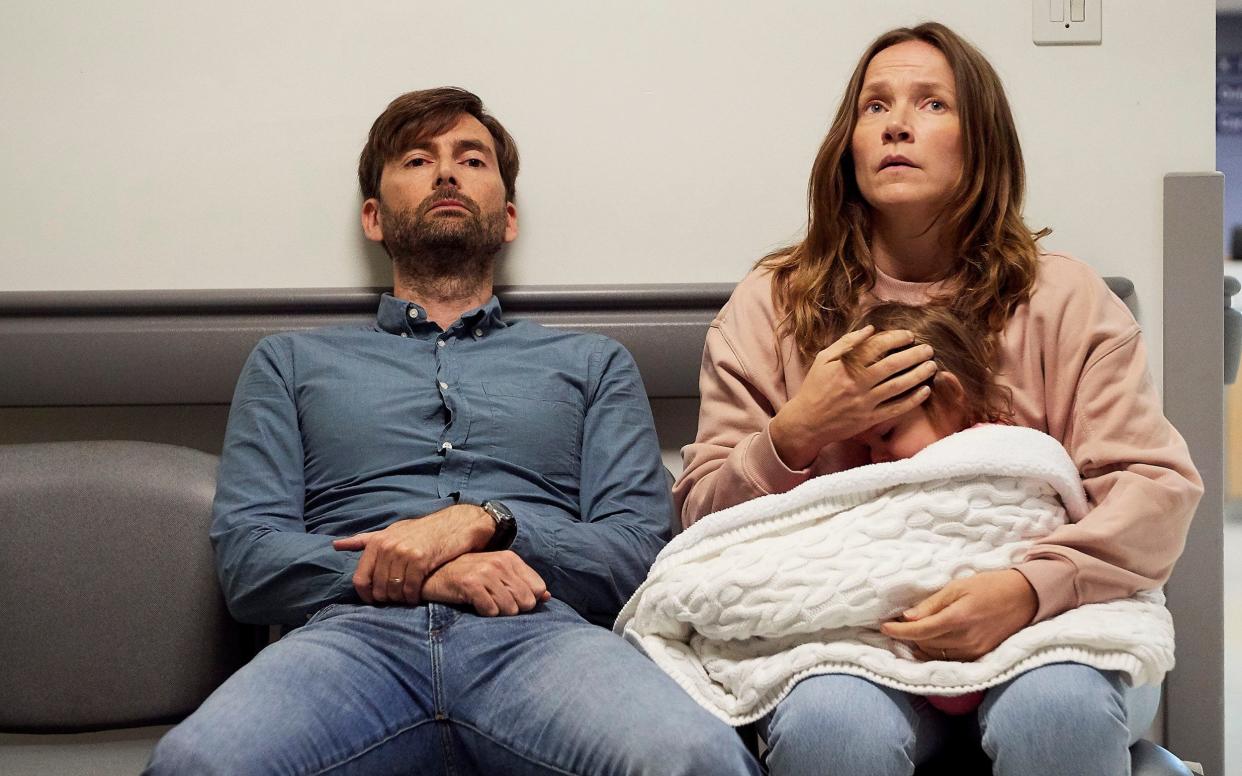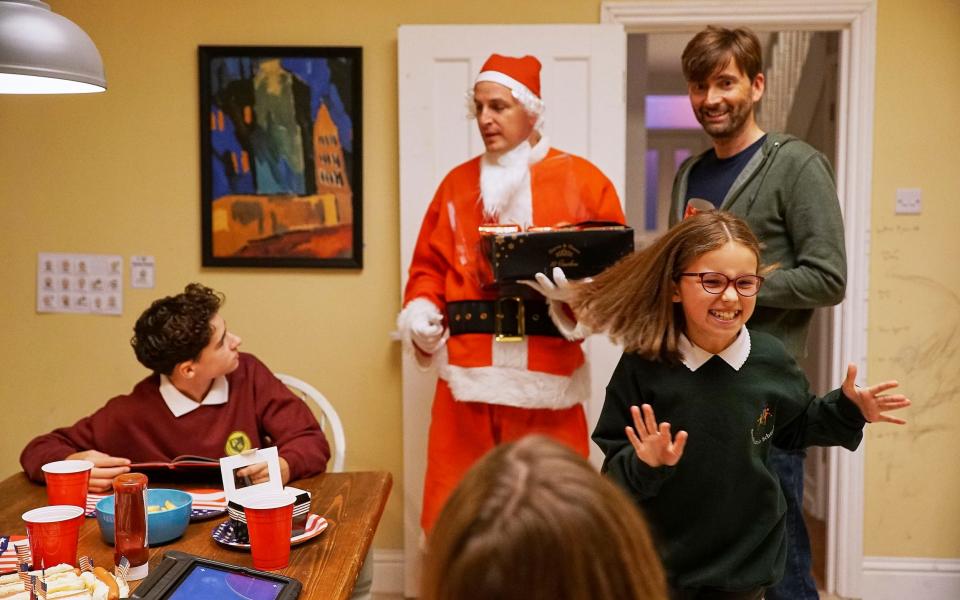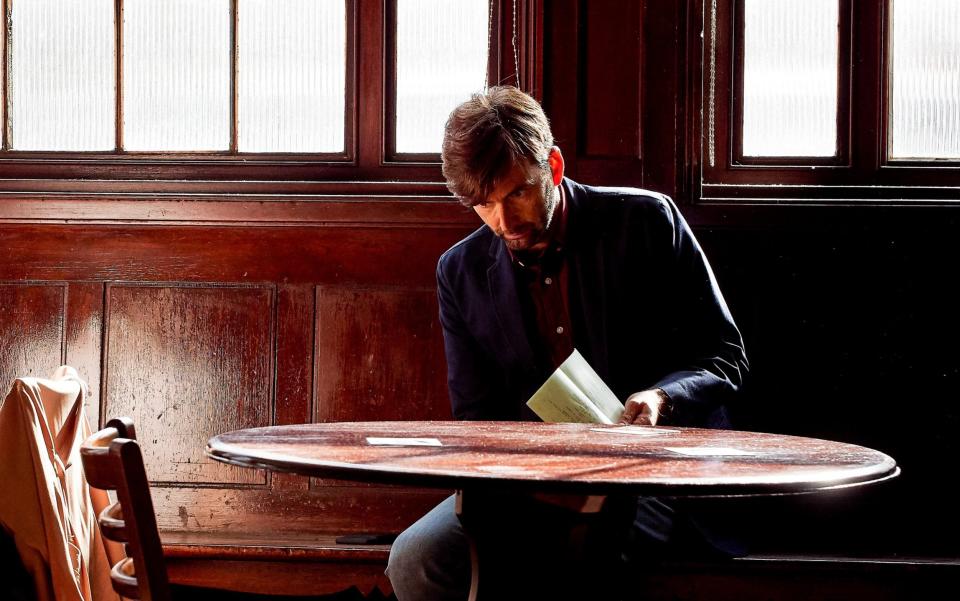There She Goes writer Shaun Pye: 'No one wants to have a child with a learning disability'

“You’ve caught me at a great time,” says the comedy writer Shaun Pye. “She’s just been attacking me with her nails and she bit me on the arm. There’s blood running down my hands as we speak.” I am calling Pye to talk about There She Goes, the Bafta-winning BBC comedy-drama he co-writes with his wife, Sarah Crawford, which returns for a second series tonight. Which means, ultimately, I am calling Pye to talk about his daughter, Joey, the 13-year-old who has just taken chunks out of her father’s hands and who is the inspiration for the show. “Yeah, lockdown hasn’t been good,” he chuckles.
Airing in 2018, the first series of There She Goes introduced us to the Yates family, closely modelled on Pye’s own. Frazzled parents Simon and Emily (played by David Tennant and Jessica Hynes), long-suffering older brother Ben (Edan Hayhurst) and Rosie (Miley Locke), a nine-year-old with severe learning disabilities due to an undiagnosed chromosomal disorder.
Over five bracingly honest and occasionally heartbreaking episodes, we saw the delightful chaos – and sometimes not so delightful chaos – that Rosie brings to their lives. Flashbacks to Rosie’s infancy, shot in a washed-out grey, show us the punishing early months, as the parents came to terms with having a disabled child. Joey herself was born in 2006, around the time when Pye, a prolific comedy writer for shows such as Have I Got News For You and Never Mind the Buzzcocks, was enjoying a starring role as Ricky Gervais’s nemesis Greg in the sitcom Extras.
Series one of There She Goes dazzled, occasionally shocked, with its warts-and-all honesty, never sugarcoating the experience of raising a child with severe learning difficulties, and always somehow resisting the urge to be maudlin or trite. This is what it’s like, says the show – frustrating, upsetting, exhilarating, hilarious, exhausting, enlightening and really, really hard. Pye and Crawford have been hard on themselves – honest, Pye would say – showing Simon’s slump into alcoholism and Emily’s struggles with depression.

My first question for Pye, however, is not about them, but everyone else. While Simon and Emily get a hard time, that is nothing compared to the fun poked at idiotic neighbours, well-meaning friends, clueless colleagues and “helpful” grandparents. How did Pye’s nearest and dearest find watching such an autobiographical series? “The reaction was very positive,” he says. “It did touch a nerve with some family members, but not in a bad way. It brought back memories and led to discussions, especially with the grandparents about how it was in the early years of Joey’s life. Things they didn’t realise. The thing is, we included them as we wrote it; we brought them on board.”
One person they could not bring on board for feedback was Joey. Is she aware she’s a TV star? “It’s a good question and something we’ve thought a lot about. She watches a lot of television, but I don’t think she has the cognition to know we’ve done a show about her. But she loves watching Miley’s performance. Because Miley is doing all the things she loves doing. Rolling down a hill, causing chaos, tipping milk over her head, splashing the bath water all over the place. She loves seeing her world on the telly. We have wondered about taking her story and about the issues of consent, but, as Sarah said the other day, if you needed to get consent, then these stories would never get told. These people would never be represented on television.”
The show is underpinned by an incredible, wordless performance by Locke, who was eight years old when they began filming. Joey’s grandparents were astonished when they first saw the show, stunned that they were “watching Joey on the telly”. Happily, Locke and Joey have met on many occasions and enjoy playing together. “It’s amazing,” says Pye, “very few people watching will know how Joey behaves, but Miley has really captured who she is. Not just in terms of the limited vocalisation or the physical actions, but she conveys Joey’s sense of fun, her sense of chaos, her sense of anger and frustration. It’s a remarkable performance.”

As series two begins, Simon finds another hurdle to overcome – other parents who have children with disabilities. The family are invited to a fete at Rosie’s school, leading Simon to admit he doesn’t want to socialise with the other parents. “I didn’t particularly interact with the other parents,” says Pye. “We hadn’t really taken up the offers for support from any charities, either. I stepped back from it all, because I thought it would be this happy-clappy community of people who are so desperately pleased that their children had been born a certain way, a sort-of evangelical-ness about them.”
“But then we screened the series and invited some of the charities to see it. And, my God, I could not have been more wrong about them. They are so unpreachy, so down to earth. Mencap, Unique, to name just a couple. So engaging. I thought people would look down on me because I’d made this show about a child with a learning disorder, but I couldn’t have been more wrong.
"The number of people who came up to me, with a sibling or a child with a disability, and told me how much the appreciated the show. And they would tell me stories, lovely, funny stories about their children, about the time so-and-so emptied a carton of orange juice into the DVD player.”
One eye-catching facet of the show is the way in which Simon, a magazine editor rather than a comedy writer, uses humour – often dark, very much un-PC humour – to help deal with the stresses and strains of looking after Rosie. Was this Pye’s own approach? “Sometimes the easiest way to deal with something is to make a joke about it,” he says. “The black humour was certainly a strong aspect of it, using black humour as a shield. It’s a way of deflecting reality, keeping it at arm’s length. Yes, that was real, that happened.”
In fact, Pye explains, everything that happens in the show either happened in real life or else is true to the spirit of real-life events. “When Sarah and I were writing it, we asked ‘Does this feel like something you would have said?’ If I wrote a scene that sugarcoated my behaviour, then Sarah would point that out: “No, you were more horrible than.” There’s a scene in series one where Simon, drunk, shouts at Emily while they’re in bed. He’s really horrible. But it was awful at the time and I wanted everyone to know how awful it was. So we edited it until Sarah was happy that it contained the truth. I certainly wasn’t going to pull any punches about my behaviour.”
Simon’s behaviour, in those early months and years, is alarming. As Pye puts it: “I came to the conclusion early on that I love this little girl with all my heart. And that would be enough. And then I’d go and get pissed all the time. But secure in the knowledge that I wasn’t a bad man, because I loved my daughter.”
As we see in the series, it is Emily who does the heavy-lifting and most of the care for Rosie, while Simon buries himself in work, spends every hour in the pub (or in the back garden with a bottle of wine) and openly muses about the idea of having an affair with a colleague. In the second series Simon, in a powerful scene with his father, considers leaving his family.
“That scene with me and my dad is true,” says Pye. “I did go and see my father, we did talk about it. But Sarah and I are friends, we’ve been friends for a long, long, long time. We were just friends having to deal with a very difficult situation and choosing to deal with it in different way. Sarah looked deeper into what it all meant. That speech in series one, in which Emily talks about the grief she feels for the little girl that doesn’t exist, Sarah wrote that. I don’t care what people say – everyone adores their children, but no one wants to have a child with a learning disability. There’s love, absolutely there’s love, but nobody wants it to happen.”

There She Goes is elevated by the performances of Hynes, who rightly won a Bafta for the role last year, and Tennant, who sheds his usual intensity to play the joshing, fragile Simon. How was it being portrayed by a former Doctor Who and RSC stalwart? “He’s the nicest man you could possibly want to work with,” says Pye. “We went for a coffee to talk about the script and he asked me about the back story, about raising Joey. And four hours went by. And the next time I saw him, he had my mannerisms, he’d been watching me, the way I talked. Sarah said, ‘”He’s the Hamlet of his generation, I think he can manage your drunken, whining grumpiness and whatever complexity you think is in your soul.”
A third series has not been commissioned yet – “we’ll see how this one goes” – though there is clearly no shortage of material. But what does the future hold for Joey? “I've been thinking a lot about how far forward you look with someone like Joey,” says Pye. “And you don't, you just don't. All we've seen over the years is what's in front of us. And we deal with that. I have Frank, my son, and with him you are always thinking further ahead, schooling, what subjects he might study, what he’ll do when he grows up. Normal things for parents to think about. But with Joey, it is very much like waiting for dominoes to fall. You have to come to terms with the next thing first, one obstacle at a time.”
Series two of There She Goes begins on Thursday, on BBC Two, at 9.30pm

